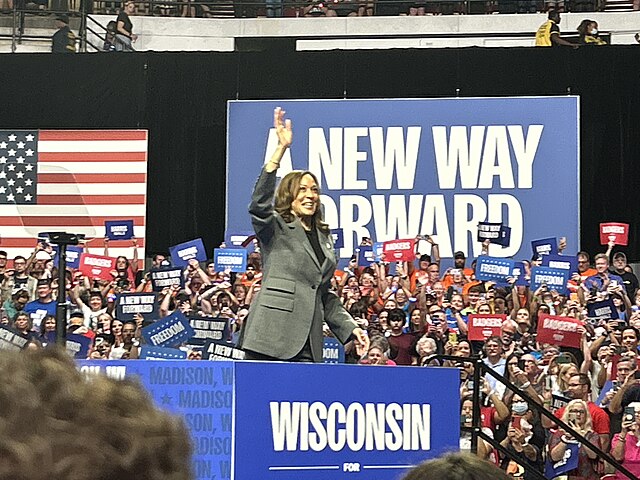It’s common for celebrity stars to endorse Presidential candidates, and this past election was no exception. The true intentions behind these endorsements and their influence on the election results are up for debate, inciting criticisms across the U.S. and throughout the Latin community.
To launch Kamala Harris’ shortened campaign in August, the 2024 Democratic National Convention (DNC), which took place at the United Center, featured many headlining artists. Stevie Wonder, John Legend, Sheila E., and P!nk sang throwback hits like “Let’s Go Crazy” and “What About Us?”
At the same time, many newer musical voices such as Megan Thee Stallion and Cardi B made their way onto the campaign trail.
Senior Roland Criswell said, “I remember seeing Megan Thee Stallion performing at the DNC this year, and when I saw her set at Lolla, she started talking about Kamala Harris.”
Hip-hop and rap, while having a distinct cultural and political legacy in the United States, have been featured in different campaigns across the spectrum.
“I’ve also noticed how Trump would sometimes meet and include the most random rappers at some of his rallies, which I thought was pretty interesting,” Roland said.
While the Republican National Convention (RNC) didn’t feature as many musical artists as the DNC, music performances still played a significant role, fueling partisan division through celebrity endorsements.
In reaction to the rise of these endorsements and performances, senior Michael Gray said, “I think that music should not have a prominent role in the political realm. So much of campaigning has become clickbait, and it’s imperative that America returns to a political climate where policy is valued over headlines.”
While truthfulness and objectivity are noble imperatives for many campaigns, there are unignorable regional and cultural benefits to incorporating pop culture into the political sphere.
Beyoncé delivered a memorable speech in her hometown of Houston at Harris’s rally on October 26. She used her speech to lift her message to the masses, promoting unity and reproductive rights.
Beyoncé used her speech to try to unite Americans. “It’s time to sing a new song,” she said to the crowd.
Like many other female celebrities, Beyoncé stood in a complex and uncomfortable position during this election cycle. Her visibility played a role in raising an important question: Do female celebrities, and women in general, bear greater expectations from and obligations to the public to comment on today’s social and political issues?
It could very well be possible. This election, in particular, was notoriously complex for women, with the chance to have had the very first female President as well as ongoing discussions regarding reproductive rights.
These high stakes may cause female celebrities to increasingly use their influence to provide support to women across America. Taylor Swift’s post about Harris’s performance at the debate spurred certain media outlets to call celebrities’ influence into question due to her immense following and influence. Swift voiced her adamant support for Harris and included a link to vote.gov, encouraging her fans to register and vote. In light of this endorsement, 340,000 people visited the site through Swift’s link.
Roland said, “As someone who’s really into music, its inclusion into political campaigns is definitely interesting to me. If a political campaign started associating itself with music or an artist I liked, it would be hard for me not to like the campaign for that, regardless of how I may have already felt.”
But for some, celebrity endorsements don’t influence voters and instead raise awareness about the current political climate.
Junior Allegra Cerda said, “It just reminds me to look into things and be up to date. Secondly and mainly, it doesn’t sway me in any way, it just validates me to see the people I like having the same views as me. I really appreciate that they’re expressing that.”
In a similar sentiment, Upper School history teacher Debbie Linder said, “Think about music not just in terms of influencing who you want to vote for, but maybe pushing you to be active.”
During contentious elections, people want to take action, usually resulting in division over celebrities’ varying opinions. And when someone influential speaks politically, it makes an already hazardous election more disjointed, increasing the need for nuanced and thoughtful celebrity takes that will unify people, not divide them.
These endorsements can bring so many people to participate in campaigns, bringing to light the power and influence of a celebrity.
Whether or not celebrity endorsement impacts political campaigns for the better, it is important to acknowledge the disconnect between celebrities and the realities faced by everyday people.
Ms. Linder said, “Maybe we need to step back a little bit, and think that there are a lot of people out there that’s more of who I relate to and identify with than those elitists who are picking our leadership.”

















































